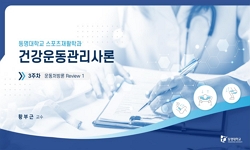PURPOSE The purpose of this study is to discuss several issues that need to be improved and changed in the Exercise Specialist Qualification System focusing on eligibility of the exercise specialist, exams, including written, oral, and practical test,...
http://chineseinput.net/에서 pinyin(병음)방식으로 중국어를 변환할 수 있습니다.
변환된 중국어를 복사하여 사용하시면 됩니다.
- 中文 을 입력하시려면 zhongwen을 입력하시고 space를누르시면됩니다.
- 北京 을 입력하시려면 beijing을 입력하시고 space를 누르시면 됩니다.
부가정보
다국어 초록 (Multilingual Abstract)
PURPOSE The purpose of this study is to discuss several issues that need to be improved and changed in the Exercise Specialist Qualification System focusing on eligibility of the exercise specialist, exams, including written, oral, and practical test, and administration of training courses.
MAIN BODY The exercise specialist should have a bachelor’s degree related to physical education that includes required courses. However, the new changes are that the number of required courses will be increased and the department certification system in physical education will be developed. The goal for the eligibility into this Exercise Specialist Qualification System will be to only allow only individuals who have physical education degrees or related. It is an alternative plan against the 2015 Exercise Specialist Qualification System, which allowed all individuals who had a bachelor’s degree to be candidates regardless of their undergraduate major.
The written test will reduce its subjects from eight to six. Catering to common standards, the subjects “Evaluation of Health and Fitness,” “Exercise Prescription,” and “Exercise Testing” will be combined; and “Prevention and Care of Athletic Injuries” will become “Exercise Injury.” It should be noted that the written test excluded “Sport Psychology” and that “Exercise Nutrition” was included in “Exercise Physiology.” Also, “Exercise Training” was included as a new written test subject. It may be difficult to forecast these numbers due to differences in positions held by certified individuals, including ministry of education, exercise specialist, faculty, and students. The exercise specialist certification exam should follow a systematic and standardized manual and evaluation index to enhance the objectivity, validity, and reliability of the certification.
The class hours of the training course were also changed. General training course hours decreased from 120 to 40, and practical training course hours decreased from 80 to 62. The reasons for decreasing course hours included: training center were mainly located in the Seoul area and lacked in other areas, inconsistent quality among training centers, and the lack of evaluations regarding the candidates’ attitude and class participation during the training courses. Ultimately, improvements to the training courses will allow for the development of multiple curricula.
CONCLUSIONS The Exercise Specialist Qualification System was developed in 2015, but several issues have been identified that include the tasks of the exercise specialist, eligibility as an exercise specialist, qualification examinations, and training courses that need improvement. Increasing the employment of exercise specialists is important in order to develop cooperation among certifying agencies.
참고문헌 (Reference)
1 정덕조, "건강운동관리사 자격제도의 정착을 위한 제언" 대한운동학회 17 (17): 81-92, 2015
2 Korean Institute of Sport Science, "The reform plan for physical education leader qualifications: Research results from a public hearing held" 2013
3 ACSM, "The gudieline of Exercise test and prescription" Lippincott Williams & Wilins 2015
4 Korea Sports Promotion Foundation, "System improvement committee sourcebook for establishing qualification system of physical education leader" 2017
5 Ministry of Culture, Sports and Tourism, "National Sports Promotion Law. National Laws Information Center"
6 "NATA"
7 "NASM"
8 "Korea Sports Promotion Foundation"
9 "ACSM"
1 정덕조, "건강운동관리사 자격제도의 정착을 위한 제언" 대한운동학회 17 (17): 81-92, 2015
2 Korean Institute of Sport Science, "The reform plan for physical education leader qualifications: Research results from a public hearing held" 2013
3 ACSM, "The gudieline of Exercise test and prescription" Lippincott Williams & Wilins 2015
4 Korea Sports Promotion Foundation, "System improvement committee sourcebook for establishing qualification system of physical education leader" 2017
5 Ministry of Culture, Sports and Tourism, "National Sports Promotion Law. National Laws Information Center"
6 "NATA"
7 "NASM"
8 "Korea Sports Promotion Foundation"
9 "ACSM"
동일학술지(권/호) 다른 논문
-
Sensory-Motor Amnesia and Somatic Solutions
- 대한운동학회
- 김정명
- 2018
- KCI등재
-
Exercise and Activation of Brown Adipose Tissue
- 대한운동학회
- 이혁종
- 2018
- KCI등재
-
- 대한운동학회
- 석헌
- 2018
- KCI등재
-
- 대한운동학회
- 김기홍
- 2018
- KCI등재
분석정보
인용정보 인용지수 설명보기
학술지 이력
| 연월일 | 이력구분 | 이력상세 | 등재구분 |
|---|---|---|---|
| 2027 | 평가예정 | 재인증평가 신청대상 (재인증) | |
| 2021-01-01 | 평가 | 등재학술지 유지 (재인증) |  |
| 2018-01-31 | 학술지명변경 | 한글명 : 운동학 학술지 -> 아시아 운동학 학술지외국어명 : The Journal of Kinesiology -> The Asian Journal of Kinesiology |  |
| 2018-01-01 | 평가 | 등재학술지 유지 (등재유지) |  |
| 2017-02-09 | 학술지명변경 | 외국어명 : The Official Journal of the Korean Academy of Kinesiology -> The Journal of Kinesiology |  |
| 2015-01-01 | 평가 | 등재학술지 유지 (등재유지) |  |
| 2014-09-18 | 학술지명변경 | 외국어명 : 미등록 -> The Official Journal of the Korean Academy of Kinesiology |  |
| 2011-01-01 | 평가 | 등재학술지 선정 (등재후보2차) |  |
| 2010-01-01 | 평가 | 등재후보 1차 PASS (등재후보1차) |  |
| 2008-01-01 | 평가 | 등재후보학술지 선정 (신규평가) |  |
학술지 인용정보
| 기준연도 | WOS-KCI 통합IF(2년) | KCIF(2년) | KCIF(3년) |
|---|---|---|---|
| 2016 | 0.57 | 0.57 | 0.66 |
| KCIF(4년) | KCIF(5년) | 중심성지수(3년) | 즉시성지수 |
| 0.63 | 0.67 | 0.686 | 0.03 |





 KCI
KCI 스콜라
스콜라


